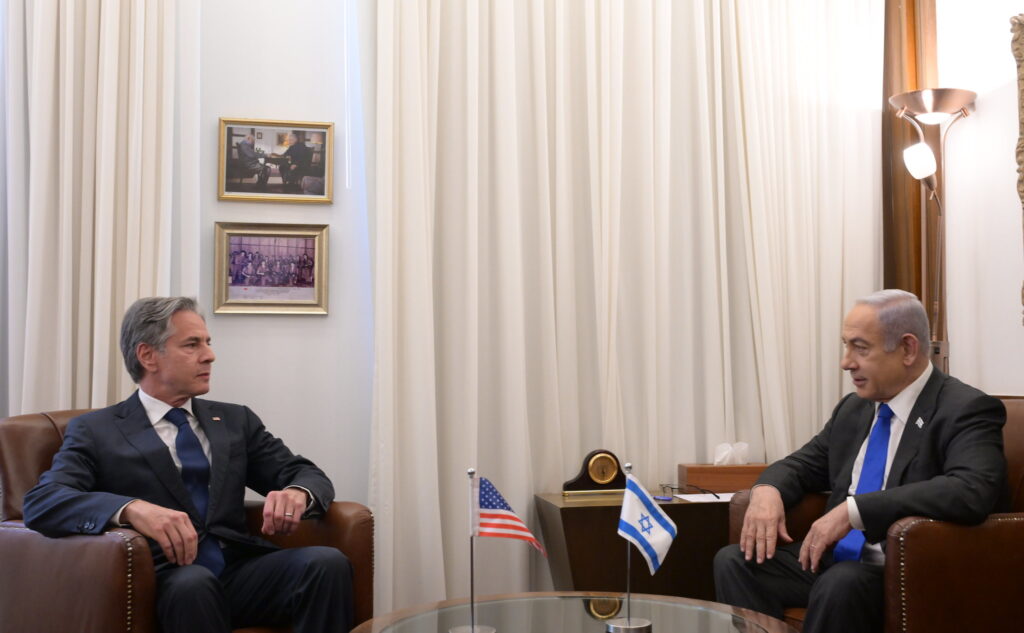Australia/Israel Review
How to End the War in Gaza
Jul 3, 2024 | David Makovsky, Dennis Ross

For Israelis, it’s still October 7. It is not just the shock and the horror of that day. The hostages are a daily reminder of a continuing trauma. President Biden has focused on a deal that gets the hostages released and sets in motion a process that leads to the end of the war in Gaza. Prime Minister Binyamin Netanyahu says the war can only end with Hamas’ military destroyed, it no longer being in control of Gaza and with the hostages returned.
The two share the same basic objective, but neither has offered a clear enough explanation of when and how the war can end. From the beginning, Netanyahu has spoken of “total victory”, which is a slogan and not an objective. True, sloganeering leaves room for Netanyahu to manoeuvre. But his desired endpoint is clearly broader than Biden’s goal of making Hamas “no longer capable” of carrying out large-scale attacks on Israel.
If Netanyahu’s definition is too broad, Biden’s is too narrow. It leaves open the possibility of Hamas being able to reconstitute and rebuild itself. But there is a path forward that both leaders could forge together. And it would be based on the demilitarisation of Gaza and the guarantee that it could never again be militarised.
Israel is already close to dismantling Hamas as a military force. Once Israel completes the destruction of the remaining battalions in Rafah and central Gaza, Hamas will no longer have organised military units with clear command and control. To complete demilitarisation, Israel must destroy enough of the Hamas military infrastructure – its weapons labs, production facilities, depots and tunnels – so that reconstitution becomes impossible without ongoing resupply.
These are measurable objectives. Because the Israelis are close to defeating Hamas as a military, the Biden Administration should now seek to reach an agreement with the Israeli Government on how much is enough when it comes to destroying the military infrastructure. In turn, the Israelis should ask the Biden Administration to outline everything the United States and its allies will collectively do to cut off money, materials and weapons to Hamas, ensuring it can never rebuild itself.
Gaza’s border with Egypt must be secured to prevent smuggling above and below ground. Even though Israel tried to restrict what went into Gaza, Hamas successfully smuggled everything it needed to build both the 500 kilometres of tunnels and a military-industrial base capable of producing missiles and bombs. A US-Egyptian agreement on managing this border is therefore essential. The United States can provide sensors to detect and stop any tunnels from being rebuilt, but Egyptian President Abdel Fatah El-Sisi must know that shutting down smuggling will be a test of the US-Egyptian relationship. The Biden Administration could provide a significant financial incentive to Egypt to stop the smuggling by allowing Egyptian contractors to take the lead in the reconstruction of Gaza.
Stopping the smuggling is crucial. But if there isn’t a credible team on the ground to manage the reconstruction process, Hamas will end up diverting legally imported reconstruction materials for its own purposes. Let’s be clear: A UN-brokered effort to halt the diversion of reconstruction materials clearly failed after the Israel-Hamas war of 2014. The United States will have to do better. It will have to put in place a mechanism to track materials from their point of entry, to storage, to end-use. Any diversion would need to immediately halt reconstruction.
For the “day after,” the Biden Administration has been planning an international task force with Egyptians, Emiratis and others providing security as the Israel Defence Forces withdraw following the hostages being released. Such a task force needs to have Palestinians as part of the administration. But these Palestinians need to be untainted by association with Hamas or any other faction. Palestinians with proven track records, like Salam Fayyad or Jihad Alwazir, could play such a role. Both are products of the International Monetary Fund system and know a great deal about development and the realities in Gaza.
Though the Israelis might be on the verge of demilitarising Gaza, they have not disarmed all Hamas fighters and have little prospect of doing so no matter how long they stay. The question, therefore, is how the international forces deal with the remaining Hamas holdouts. Will they try to impose order? Or will they seek some kind of understanding with these fighters to keep the peace? And will there be any circumstances in which they would accept Israel responding to a threat they cannot contain? (Certainly, they must know that Israelis will act against any direct threat to Israel.)
Any outside actor planning to stabilise Gaza must be prepared to answer these difficult questions. But they are particularly sensitive for Arab leaders who do not want to be seen as using force on Palestinians on behalf of Israel.
We have not tried to address all issues, including whether this process can begin without a political horizon for eventual Palestinian self-governance – or at least clarity on whether the Palestinian Authority is actually going to be reformed. But not all questions need to be answered to start thinking about an endgame.
If the United States and Israel can agree on an endpoint to the war, many other things can fall into place. If not, far worse outcomes are looming in the region.
Dennis Ross is the Counsellor and William Davidson Distinguished Fellow at the Washington Institute for Near East Policy and former special assistant to President Obama. David Makovsky is the Institute’s Ziegler Distinguished Fellow and a former official on the US State Department’s Middle East peace negotiating team. This article was originally published on the Washington Post website. © Washington Institute (washingtoninstitute.org), reprinted by permission, all rights reserved.
Tags: Gaza, Hamas, Israel, Palestinians






